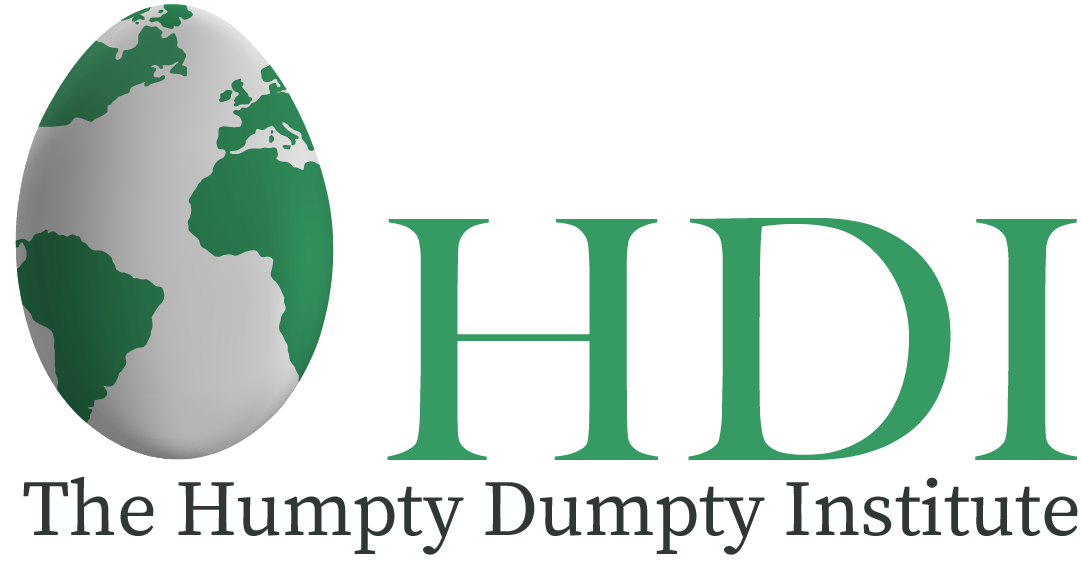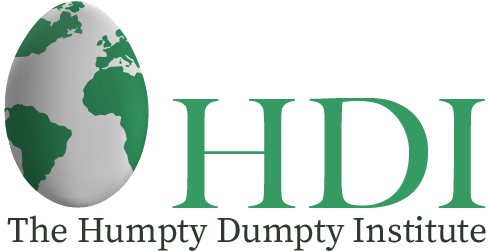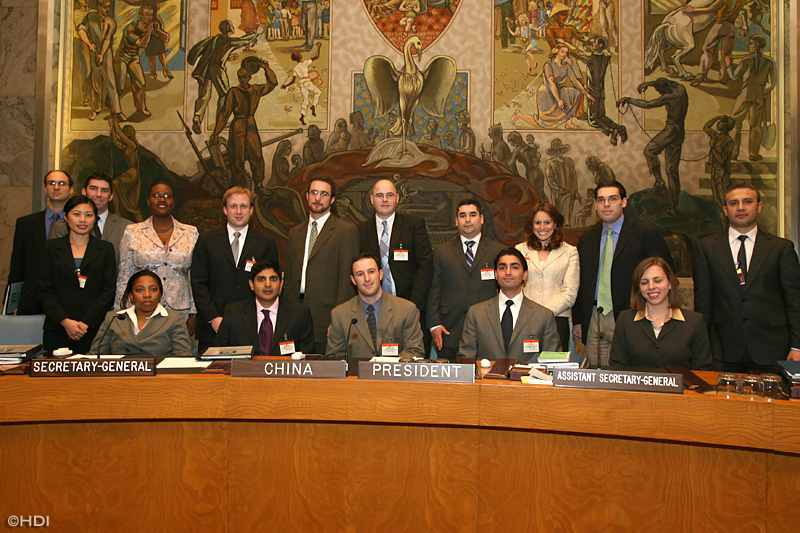House and Senate Foreign Policy Advisors
The Humpty Dumpty Institute sponsored its 18th Congressional Delegation to the United Nations Headquarters on April 10, 2006.
The bipartisan delegation of senior Republican and Democratic foreign policy aides met with senior officials from the U.S. Mission and the United Nations to discuss a number of topics central to the ongoing debate in Washington on U.S.-U.N. relations, particularly U.S. priorities toward U.N. reform.
Executive Summary
The Humpty Dumpty Institute sponsored its 18th Congressional Staff Delegation to the United Nations on Monday, April 10, 2006. With this delegation, HDI achieved a significant milestone in its work – more than 300 Congressional offices have now visited United Nations Headquarters through HDI sponsored programs.
This bipartisan delegation of senior Republican and Democratic foreign policy aides met with senior officials from the U.S. Mission and the United Nations to discuss a number of topics central to the ongoing debate in Washington on U.S.-U.N. relations, particularly U.S. priorities toward U.N. reform. These topics included a special briefing on the new Human Rights Council with U.N. High Commissioner for Human Rights Louise Arbour, a briefing on the new U.N. Democracy Fund, U.N. peacekeeping, a series of new U.N. management reforms proposed by Secretary-General Kofi Annan, and collaboration between the U.S. and the U.N. on combating human trafficking.
The Briefings
Ambassador Alejandro Daniel Wolff, Deputy Permanent Representative of the U.S. Mission to the UN, welcomed the delegation on behalf of Ambassador John Bolton. Ambassador Wolff discussed U.S. priorities in terms of enhancing the efficiency of the U.N. and strengthening the authority of the Secretary-General to implement meaningful reforms (numerous reforms currently require the approval of the 191-member U.N. General Assembly). Ambassador Wolff also discussed in great detail the reasons for the U.S. voting against passage of the new U.N. Human Rights Council, which passed by a vote of 170-4 a few days prior to the trip, but emphasized that the U.S. will remain engaged in the process of fashioning and strengthening the new Council into an effective and transparent body. Finally, Ambassador Wolff urged Congress to be aware that the 191 U.N. member-states bear much of the responsibility for enacting U.N. reforms – not the U.N. Secretariat.
Simone Monasebian, Chief of the New York Office of U.N. Office on Drugs and Crime (UNODC), discussed the $7 billion a year illicit human trafficking industry, and emphasized the strong degree of cooperation between the U.S. and the United Nations in halting trafficking. She commended the U.S. Congress for its commitment to combating human trafficking and praised President Bush for signing the Trafficking Victims Protection Reauthorization Act of 2003. Ms. Monasebian noted that human trafficking is a multi-dimensional problem that encompasses the transport of individuals for the purposes of pornography, sex, and labor. She emphasized that a holistic approach that is required to defeat human trafficking, one that involves robust legal measures, better police training, and targeted educational programs. Ms. Monasebian also noted that better statistics need to be gathered regarding the problem so that more effective strategies can be produced to curtail it.
Peter Smith, Senior Administrative Officer for the Office of the Under-Secretary-General for Management, spoke at length about U.N. reform, emphasizing that the three main goals of the reform process are accountability, transparency, and integrity. Among many of the accomplishments achieved by the U.N. in the last year – not coincidentally, the same objectives have been listed as critical priorities by the United States – are the creation of a new Ethics office, a whistleblower policy, a complete review of all existing U.N. mandates, which are often duplicative and out-dated, and an induction program for senior staff to review an organizational code of conduct. On the horizon, the U.N. is also moving to adopt accounting standards by 2010 to make the U.N. more financially transparent and accountable, as well as the creation of an independent audit advisory committee to help improve U.N. transparency and accountability.
David Harland, Acting Director for Change Management of the Department of Peacekeeping Operations (DPKO), spoke at length about the impact of U.N. peacekeepers in resolving conflicts around the world. With nearly 90,000 peacekeepers on 4 continents, U.N. peacekeepers are engaged in 18 of the world’s 28 conflicts, and represent a larger force than any deployed national army with the exception of the U.S. military in Iraq. Mr. Harland reported that U.N. peacekeeping is having a major impact: the 28 wars across the globe are much fewer than the 50 wars of the early 1990s. Mr. Harland stated that the U.N. has been remarkably successful at state-building in countries devastated by civil war, developing institutions such as a free press, an independent judiciary, and a market economy. Likewise, the U.N. has helped to draft constitutions, organize elections, and strengthen government bureaucracies under very difficult conditions. And it has accomplished these successes in an extremely cost-effective manner, as demonstrated in a recent report by the U.S. Government Accountability Office and attested to by senior U.S. officials such as Secretary of State Condoleeza Rice and National Security Advisor Stephen Hadley.
Looking ahead, Mr. Harland noted that there are two major ways in which the U.N.’s peacekeeping capacity can be enhanced. First, he stated that it would be helpful for major Western countries to contribute more troops to such operations, since their troops often have specialized skills that would make peacekeeping contingents more versatile. Second, he noted that deployment of large numbers of troops in the field at the outset of an operation – what he called “surge capacity” – would help to contain conflicts before they become much more destructive.
The Hon. Louise Arbour, U.N. High Commissioner for Human Rights, discussed the new Human Rights Council during a working lunch with the congressional staff delegation. She stated that she believes that the new Human Right Council will strengthen the U.N.’s machinery for addressing human rights challenges. Ms. Arbour noted that countries serving on the Council can be removed by a two-thirds vote of the General Assembly, which creates disincentives for them to violate human rights standards. She also cited the fact that membership criteria for the Council are much more stringent than under the Commission, requiring a majority vote of the General Assembly by secret ballot.
While optimistic about the Council’s potential impact, Ms. Arbour said that U.S. leadership will be critical to the U.N.’s future success human rights arena. Moving ahead, the U.S. can play a constructive role in promoting human rights within the framework of the U.N. system, even though it voted against the establishment of the Council and has chosen not to run for membership on the new body. Ms. Arbour was encouraged by the US’s financial support for the Council, in spite of its reservations about the Council’s procedural and structural mechanisms. She is hopeful that the U.S. will work constructively as an outsider to strengthen the Council and that it will consider being a candidate for membership in future years.
Amir Dossal, Executive Director of the U.N. Fund for International Partnerships (UNFIP), and Magdy Martinez-Soliman, the Executive Head of the U.N. Democracy Fund, applauded the United States’ commitment to the Democracy Fund and discussed how this new institution will function. Mr. Martinez-Soliman noted that the United States has committed $10 million dollars to the Fund, which currently has $50 million in contributions. He said that he was optimistic that this new initiative will foster democracy worldwide by promoting civil society and effective governance through financial, legal, and technical assistance.
Fritz Reuter, Executive Director of the U.N. Capital Master Plan, noted that the U.N. complex has experienced significant wear and tear since its construction over 50 years ago and is not compliant with several basic safety codes. He gave several examples of how the U.N. complex is unsafe: sprinklers do not work, the fire alarm system is obsolete, asbestos insulates large parts of the structure, and pieces of cement fall from walls from time to time. Several studies by the U.S. Government Accountability Office have analyzed the problem, and a complete set of designs and plans have been created for the renovation. Mr. Reuter indicated that the overall project will cost in excess of 1.58 billion to implement, and asked for the staff delegation’s assistance in getting the U.S. Congress to support the Capital Master Plan.
Schedule
Sunday, April 9
Check in to the Millennium U.N. Plaza Hotel
Location: 1 U.N. Plaza (44th St, between 1st & 2nd Avenues)
6:30 pm
Welcome Reception at the Wheeltapper Pub
Location: 141 East 44th Street (Inside the Fitzpatrick Grand Central Hotel between Lexington & 3rd Avenues)
Monday, April 10
7:45 am
Meet in hotel lobby for breakfast
9 – 9:30 am
US Priorities at the United Nations
Ambassador Alejandro Wolff, Deputy U.S. Permanent Representative
Location: Conference Room 8
– Short break –
9:45 – 10:30 am
The Role of the U.N. in Combating Human Trafficking
Simone Monasebian, Chief, NY Office, U.N. Office on Drugs and Crime
Location: Conference Room 8
10:30 – 11:15 am
Current Issues in U.N. Management Reform
Cass DuRant & Peter Smith, Senior Advisers, Department of Management
Location: Conference Room 8
– Short break –
11:30 – 12:15 pm
Challenges Faced by Increased U.N. Peacekeeping
David Harland, Chief, Peacekeeping Best Practices Unit
Location: Conference Room 8
12:30 – 1:45 pm
Luncheon: Human Rights and the New U.N. Human Rights Council
Louise Arbour, U.N. High Commissioner for Human Rights
Location: Delegates Dining Room 1
2 – 2:45 pm
Discussion of the New U.N. Democracy Fund
Amir Dossal, Executive Director, U.N. Fund for International Partnerships
Magdy Martinez-Soliman, Executive Head, U.N. Democracy Fund
Location: Conference Room 8
2:45 – 3:30 pm
UN Headquarters Site Inspection Tour
3:30 pm
Program Concludes
Participants:
United States Congress – Senate Staff
Ami Desai, Office of Sen. Hillary Clinton (D-NY)
Charles A. Fitzpatrick, Office of Sen. Arlen Specter (R-PA)
Rachelle Johnson, Office of Sen. Thad Cochran (R-MS)
Van Luong, Office of Sen. Daniel Inouye (D-HI)
Mark Silverman, Office of Sen. Lincoln Chafee (R-RI)
Chris Socha, Office of Sen. James DeMint (R-SC)
United States Congress – House Staff
Beth Daniel, House Subcommittee on National Security – Majority
Kevin Donnelly, Office of Rep. Steve Rothman (D-NJ)
Matthew Horowitz, Office of Rep. Shelley Berkley (D-NV)
Dan Lopez, Office Rep. William Delahunt (D-MA)
Ven Neralla, Office of Rep. Barbara Lee (D-CA)
Jordan Press, Office of Rep. Christopher Shays (R-CT)
Sylvia Oyinlola, Office of Rep. Juanita Millender-McDonald (D-CA)
Halie Soifer, Office of Rep. Robert Wexler (D-FL)
United States Mission to the United Nations
Ambassador Alejandro Wolff, Deputy Permanent Representative
Sarah Demarest, Deputy to the U.S. Ambassador, US/UN – Washington Office
Peggy Kerry, NGO Liaison
United Nations
The Honorable Louise Arbour, U.N. High Commissioner for Human Rights (UNHCHR)
Amir Dossal, Executive Director, United Nations Fund for International Partnerships
Cass DuRant, Senior Adviser, Office of the Under-Secretary-General for Management
David Harland, Acting Director for Change Management, DPKO
Craig Mokhiber, Deputy Director, New York Office of the UNHCHR
Simone Monasebian, Chief, U.N. Office on Drugs and Crime
Michael Pan, First Officer for Human Rights, Executive Office of the Secretary-General
Peter Smith, Senior Officer, Office of the Under-Secretary-General for Management Magdy Martinez Soliman, Executive Head of U.N. Democracy Fund
Louis Frederick Reuter, Assistant Secretary-General, U.N. Capital Master Plan
Observers
Deborah Derrick, Director, Better World Campaign
Susan Myers, Executive Director, United Nations Foundation – NY Office
Robb Skinner, Director of External Relations, United Nations Foundation – NY Office
The Humpty Dumpty Institute
William Rigler, Executive Director
Caroline Gosselin, Program Manager
Paul Romita, Associate
Tahir Cevik, Associate
William Farrington, Photographer



















